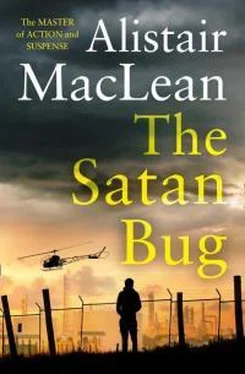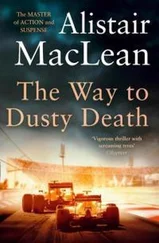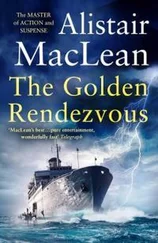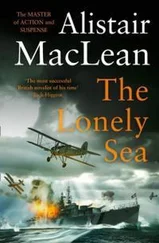It was then that Mary broke through her terror-ridden thrall. She was tied to the arms of her seat but her feet were free and suddenly she jackknifed herself and kicked up with both legs with all the strength that was in her. She was wearing Italian shoes and for the first time in my life I put up a prayer of thanksgiving for those sharply pointed monstrosities. Scarlatti cried out with pain as they caught him just behind the right knee, his leg sagged and for the one moment that was the only moment I would ever have, his grip on my throat slackened. With a convulsive jerk of arms and neck I braced myself forward, my left leg swinging high, and he staggered backward. And then I was clear of the door, chopping aside his snarling crouched figure as I passed him and ran up the aisle.
I didn’t run far. Buckley was coming through the doorway at the other end, a gun in his hands. I wondered dimly what in the name of God had kept him until now, it shouldn’t have taken more than ten seconds to set the helicopter on automatic pilot and scrabble around for a gun after he’d straightened out, and then I realised that no more time than that had passed since he had straightened out the helicopter. It had only seemed like an eternity, that was all.
He saw me coming, threw the gun to me. I caught it, taking care even at that moment not to let it strike anywhere near the viruses. I whirled, gun in hand, but Scarlatti wasn’t coming for me any more.
He was standing quietly by the doorway, still doubled over with pain. His eyes were on me, but they didn’t seem crazed any more. He straightened slowly and said, “Don’t bother to fire, Cavell.”
“I won’t fire,” I said.
“End of a dream,” he said conversationally. He was standing close to the doorway, the wind and the rain were driving in hard against him, but he didn’t even seem to notice it. “Maybe this is the way the dreams of people like myself always end.” He paused, then looked at me almost quizzically. “You never really expected to see me in the Old Bailey?”
“No,” I said. “I never really expected it.”
“Can you see a man like me on trial for my life?” he persisted.
“I can’t see it,” I said.
He nodded, as if in satisfaction. He took a step nearer the open doorway, then turned again. “But it would have been nice,” he said, “to see what they would have said in the New York Times.” His voice was almost sad. Then he turned away and stepped out into the darkness.
I cut Mary loose and chafed the blood back into her hands while Buckley went forward to contact the police and call off their Flying Squad cars. After a few minutes we both went forward, as Buckley drifted down towards the heliport, and I picked up the phones.
The General said, “So she is safe.”
“Yes, sir. She’s safe.”
“And Scarlatti is gone?”
“That’s it, sir. Scarlatti is gone. He just stepped out of the plane.”
Hardanger’s voice broke in, harsh and gravelly as ever. “Did he fall or was he pushed?”
“He fell.” I hung up the phones. I knew they would never believe me.
Конец ознакомительного отрывка
Купить книгу












